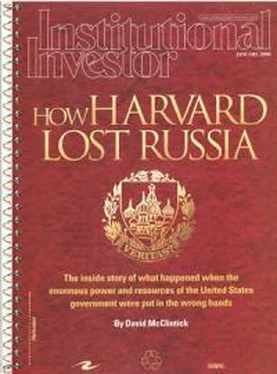Summers did not restrict his warnings to Shleifer.
"There might be a scandal, and you could become embroiled," Summers told Zimmerman. "You should make sure you're clear with everybody. People might want to make Andrei a problem some day. The world's a shitty place."
Summers' warnings proved at once prophetic and ineffectual. Even as Shleifer and his wife strove to reassure their friend, they were maneuvering to make an investment in Russia's first authorized mutual fund company. Within eight months their private Russian dealings, together with those of close associates and relatives, would explode in scandal -- bringing dishonor to them, Harvard University and the U.S. government. The Department of Justice would deploy the Federal Bureau of Investigation and the U.S. Attorney's Office in Boston to launch a criminal investigation that would uncover evidence of fraud and money laundering, as well as the cavalier use of U.S. government funds to support everything from tennis lessons to vacation boondoggles for Harvard employees and their spouses, girlfriends and Russian pals. It would, in the end, be an extraordinary display of an overweening "best and brightest" arrogance toward the laws and rules that the Harvard people were supposed to live by.
Says one banker who was a frequent visitor to Russia in that era, "The Harvard crowd hurt themselves, they hurt Harvard, and they hurt the U.S. government."
Mostly, they hurt Russia and its hopes of establishing a lasting framework for a stable Western-style capitalism, as Summers himself acknowledged when he testified under oath in the U.S. lawsuit in Cambridge in 2002. "The project was of enormous value," said Summers, who by then had been installed as the president of Harvard. "Its cessation was damaging to Russian economic reform and to the U.S.-Russian relationship."
Reinventing Russia was never going to be easy, but Harvard botched a historic opportunity. The failure to reform Russia's legal system, one of the aid program's chief goals, left a vacuum that has yet to be filled and impedes the country's ability to confront economic and financial challenges today (see box, page 77).
Harvard vigorously defended its work in Russia, but in 2004, after protracted legal wranglings, a judge in federal district court in Boston ruled that the university had breached its contract with the U.S. government and that Shleifer and an associate were liable for conspiracy to defraud the U.S. Last August, nine years after Summers and his protégé took their stroll along that Truro beach, Harvard, Shleifer and associates agreed to pay the government $31 million-plus to settle the case. Shleifer and Zimmerman were forced to mortgage their house to secure their part of the settlement.
Russia's struggles today certainly don't result entirely from Harvard's misdeeds or Shleifer's misconduct. There is plenty of blame to share. It is difficult to overstate the challenge of transforming the economic and legal culture, not to mention the ancient pathologies, of a huge, enigmatic nation that once spanned one sixth of the earth's land surface, 150 ethnicities and 11 time zones. The Marshall Plan, by comparison, was simple.
Summers wasn't president of Harvard when Shleifer's mission to Moscow was coming apart. But as a Harvard economics professor in the 1980s, a World Bank and Treasury official in the 1990s and Harvard's president since 2001, Summers was positioned uniquely to influence Shleifer's career path, to shape U.S. aid to Russia and Shleifer's role in it and even to shield Shleifer after the scandal broke. Though Summers, as Harvard president, recused himself from the school's handling of this case, he made a point of taking aside Jeremy Knowles, then the dean of the faculty of arts and sciences, and asking him to protect Shleifer.
Months after Harvard was forced to pay the biggest settlement in its history, largely because of his misdeeds, Shleifer remains on the faculty. No public action has been taken against him, nor is there any sign as this magazine goes to press in late December that any is contemplated.
Throughout the otherwise voluble university community, there has been an odd silence about the entire affair. Discussions mostly have taken place sotto voce in deans' offices or in local Cambridge haunts, such as the one where a well-connected Harvard personage expressed deep concern, telling II : "Larry's handling of the Shleifer matter raises very basic questions about the way he governs Harvard. This is fraught with significance. It couldn't be more fraught."
The silence is now beginning to break, thanks to the leadership of academic worthies like former Harvard College dean Harry Lewis, who is finishing a book about the university to be published in the spring by Perseus Public Affairs. Lewis agreed to show II the manuscript, in which he asserts, "The relativism with which Harvard has dealt with the Shleifer case undermines Harvard's moral authority over its students."
Whether this new questioning will erupt into yet another crisis engulfing Summers and the university remains unclear. What is certain, though, is that the story of Harvard and its representatives' malfeasance, told in full for the first time over the following pages, shows how much damage can be done when the considerable power and resources of the U.S. government are placed in the wrong hands.
THE SEEDS OF RUSSIAN REFORM WERE planted in the late 1980s -- when Russia was the Soviet Union and Harvard hadn't yet arrived. The U.S.S.R.'s seven-decade experiment with Marxist-Leninist totalitarianism lay in shambles. By 1989, even as the Berlin Wall fell in Germany, the Soviet Union and its economy were imploding.
Reform-minded Mikhail Gorbachev, the last general secretary of the Communist Party, strove to introduce limited economic and political change. The first competitive elections for the Congress of People's Deputies were held in March 1989. In May 1990, Gorbachev's populist rival, the maverick Boris Yeltsin, was elected chairman of the Russian Republic's Parliament. A month later Russia declared itself independent of the Soviet Union.
That summer Gorbachev and Yeltsin ordered two economists to draw up a "500 Days" plan for converting the Soviet Union to a market economy based on private property. Gorbachev also sought advice from the West. In October 1990 the then-chairman of the New York Stock Exchange, John Phelan Jr., led a group of U.S. securities lawyers and academics to Moscow to begin showing the Soviets how to form capital markets. The meeting was organized by the Big Board's Russian-speaking legal counsel, Richard Bernard, then 40.
Bernard's collaborator in organizing the meeting was a leading Soviet attorney, Peter Barenboim. Together they formed the Soviet-American Securities Law Working Group, or SASLAW, which began drafting securities laws for the U.S.S.R.
On October 15, 1990, two days after the Americans returned to New York, Gorbachev was awarded the Nobel Peace Prize. The next day, under pressure from the KGB and Kremlin hard-liners, Gorbachev withdrew his support for the 500 Days plan. But it was too late to reverse the tide of change. In December, Yeltsin, from his leadership post in Parliament, pushed through legislation that would allow limited private land ownership in Russia for the first time since the 1917 revolution. In June 1991, Yeltsin was elected president, the first leader of Russia to be popularly elected. Then, in August, after a failed coup attempt by Communist revanchists, Gorbachev resigned as general secretary of the Communist Party, dissolved its central committee and effectively ceded power to Yeltsin.
The new leader treated his victory as a window of opportunity -- one that would slam shut if he didn't show results promptly. Transforming the economy was his first priority. He set a young economist named Yegor Gaidar and a group of planners to work in a dacha outside Moscow in September and October. Gaidar had grown up in the Moscow intelligentsia and had a Ph.D. in economics from Moscow State University. He had been convinced for years that the Soviet Union needed to transform itself into a free-market economy based on Western models.
Читать дальше






![Джонатан Димблби - Barbarossa - How Hitler Lost the War [calibre]](/books/385421/dzhonatan-dimblbi-barbarossa-how-hitler-lost-the-w-thumb.webp)





